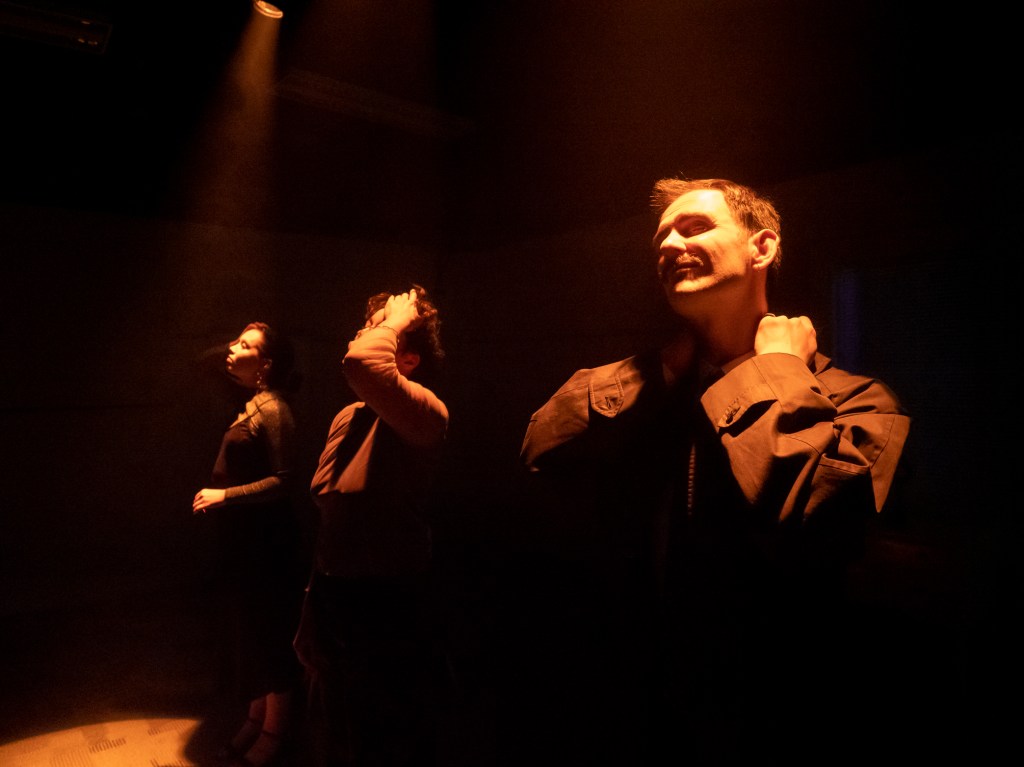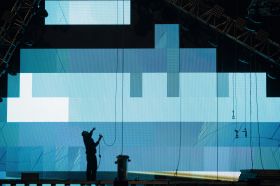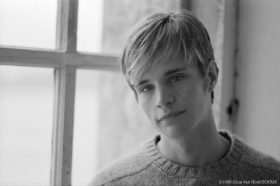With Hell is Other People, Monkey Brain director, Yvan Karlsson, has reimagined Jean-Paul Sartre’s one-act existentialist hellscape No Exit/Huis Clos as a series of exquisite movement sequences, turning a timeless philosophical examination into a wordless work of nuanced physical theatre.
For context, Sartre’s No Exit introduces the audience to a newspaper man named Garcin, a sapphic postal worker named Inèz and superficial Estelle. The trio meet in hell, where they cannot sleep, blink, cry or leave. Surprised by the lack of torture devices, they realise over the course of the play that hell is actually other people. This is not to say that people are bad, but it does express an intentional reflection on Sartre’s conceptions of ‘the look’ and ‘bad faith’. These characters have spent their lives living in bad faith, in various ways, and now, in hell, they’re stuck with themselves.
Karlsson’s non-verbal version of the play expresses the intentionality of perceiving that which is fundamentally true, without becoming distracted by what the characters may verbally claim. Sartre’s valet character has become, under Karlsson, the Worker. Garcin is now named Sam, Inéz is called Marty and Estelle is Gia. These characters frustrate and humiliate one another and, while the titular line, ‘Hell is other people’, is never technically uttered in this incarnation, it is a permanent unspoken force driving the action.
Sartre’s No Exit is set in a drawing room, whereas Hell is Other People is cleverly set in a modern conception of a bureaucratic waiting room. The beige nothingness of the set (complete with obligatory water cooler and fake pot plant) sets the perfect tone for a hellish philosophical comedy.
The Worker (Nathan Di Giovanni) opens the performance with a comically-mimed musical performance. He constantly messes with the waiting room’s symmetry, with his tendency to unstraighten signs revealing a subversive side to this character. For those who don’t already know, this is hell. And what is hell without creepy music, a fog machine, dramatic silhouettes and a cheap plastic pot plant?
A shadow precedes the arrival of Sam (Tim Green), who wears an old-fashioned coat and satchel. Within moments of entering the room, he compulsively restores its order and symmetry. Shortly thereafter, self-assured Marty (Lucy Wong) takes a ticket from the Worker without waiting to be offered, suggesting adequate levels of personal agency. Glamorous Gia (Kimberly Parkin) appears, accompanied by the disembodied cries of her murdered child, although her backstory is never explicitly explained.
The audience can sense Sam is other-focused and seeks validation. To Marty, the reactions of the other characters exist, but are mostly irrelevant. She sees, but isn’t shaken by, Sam’s obvious distress. In one standout scene, Gia and Marty explore the futility of trying to find a suitable mirror (aside from in the eyes of another) with lipstick-smears cleverly illustrating the impact of relegating one’s subjectivity to the objecthood of another person’s gaze.
The Worker, always so mischievously pleased with himself, is fully aware of the impact his actions are having on the three in the waiting room. He becomes more hellishly dishevelled as the play progresses, as does hell itself.
In some parts, the slow physical movement of the cast conveys their intense awareness of being watched. In other moments, the characters perform socially taboo acts in the form of button pushing and sign ripping. Each cast member is able to insinuate so much in the subtlest of movements, with nuanced acting and impressive dramatic physicality. Body language and intentionality of movement illustrate the social dynamics of the group, and reveal the idiosyncrasies of the characters. The cast and crew manage to convey more meaning in verbal silence than any other plays might express in an hour of rapid-fire dialogue.
The futility of specific other-oriented desires – and the impossibility of subjectivity-preservation in the eyes of other people – encompass the main themes contained in both No Exit and Hell is Other People. To Sartre, hell is the consciousness of alterity, and the experience of the other as possessing alien freedom that makes other people an existential threat to the individual. Therefore, human presence will always be a threat.
The narrative tension culminates in a not-so-silent montage, which reveals the desires concealed by the characters. The Worker, more satanically dishevelled than ever, arrives with an electric guitar. Music, dancing and slapstick violence ensues, highlighting the hilarity of human interaction in a humorous high-energy ending.
To Sartre, literature functions as an analogue of the real world, which can be acted upon by human perception to create different versions of itself. To this end, Hell is Other People is a different version of itself that somehow exceeds all reasonable expectations. The self-referential, world-referential and highly subjective nature of this play does not require the audience to have any prior knowledge of its source material. Audiences of all philosophical persuasions will adore this ingenious gem.
Read: Theatre review: At What Cost?, Belvoir St Theatre
Much laughter is sure to ensue, catalysed by the irreverent absurdity woven through the wordless narrative. Brilliantly conceived and excellently executed, this is a production that will live in your mind rent free for the rest of your life.
Hell Is Other People
Blue Room Theatre, Perth
Director/Concept: Yvan Karlsson
Producer: Ellen-Hope Thomson
Lighting Designer: Matthew Erren
Sound Designer: David Stewart
Costume Designer: Rhiana Katz
Stage Manager: Holly Ballam
Dramaturg: Humphrey Bower
Performers: Tim Green, Lucy Wong, Kimberly Parkin, Nathan Di Givoanni
Tickets: $27-$32
Hell is Other People Will be Performed until 27 May 2023.





